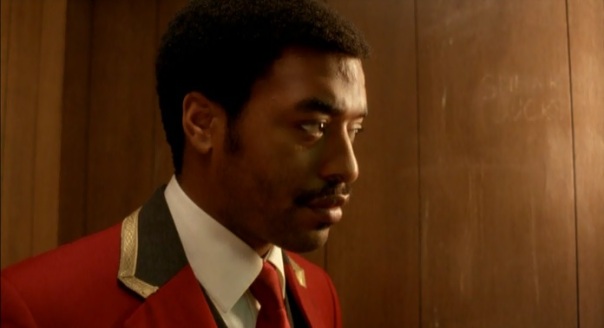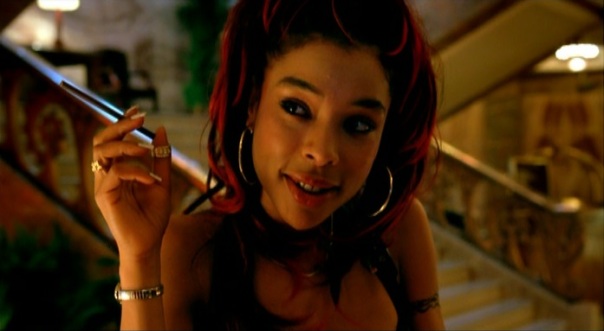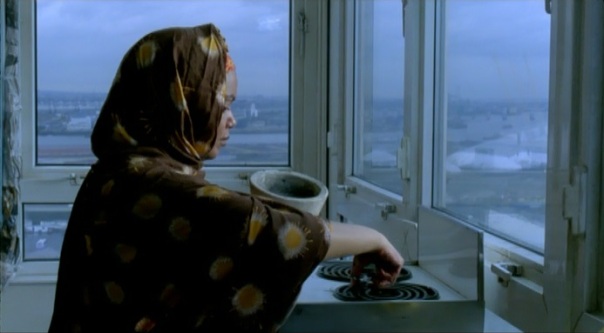Monthly Archives: March 2018
Dirty Pretty Things (2002)

Chiwetel Ejiofor
The UN reports that we’re in the middle of the largest refugee crisis in history. All over the world people are fleeing their homes to avoid getting hit by a bullet or starving on the streets. Anyone who’s watched the news has seen the images of desperate men, women, and children waiting behind barbed wire fences or drifting on the open sea in makeshift boats.
But refugees have always been with us. Since the beginning of recorded history people have been leaving their homes behind to escape poverty or persecution. Often they gravitate to cities, where they might find a job, shelter, food. And while we don’t like to admit it, cities feed on refugees. People who are desperate to escape are easy prey. If they’re desperate enough they’ll work in sweatshops, hustle contraband or sell their bodies just to feed themselves and their families. And they better not complain, because there’s always someone ready to pick them up and send them back home.
Dirty Pretty Things is set in London in the early 2000s, and it brings us into the lives of people who are living on the fringe, working two or three jobs, renting a room illegally. Okwe is from Nigeria. He works the graveyard shift at the front desk in a hotel, and then during the day drives a taxi around picking up fares. He shares an apartment with Senay, an immigrant from Turkey, paying her cash to let him sleep on the couch. But this arrangement is illegal, because Senay’s legal status doesn’t allow her to charge rent or take a paycheck. So while she has a job cleaning rooms at the same hotel Okwe works at, she has to keep that a secret, too. These people live in constant fear of being caught breaking the rules. When immigration officials knock on the door, Okwe quickly grabs his few belongings and leaps out the window. Neither of them can afford a run-in with the law.

Benedict Wong and Chiwetel Ejiofor
Writer Steven Knight quickly pulls us into the shadowy world these immigrants live in. His characters are drawn in vivid detail, and while these particular people are very much a part of urban London, anyone who lives in a city will instantly recognize them. These are the folks who are just trying to make it through the day, keeping their heads down, doing everything they can to avoid trouble. There are threats on all sides, and the smallest misstep can wreck their fragile existence. Knight takes us on an intimate, uncomfortable tour of the dark side of this metropolis, showing us the London of sweat shops and sex workers, black markets and underground parking structures. The city feels like a sinister beast, feeding on the people who keep it running. Okwe has lived in London long enough to know that life is cheap. But he doesn’t realize how cheap until he enters a flooded hotel bathroom and finds that someone has tried to flush a human heart down the toilet.
The city is hungry, and needs to be fed. Okwe, a surgeon in his native Nigeria, learns that hotel rooms are being used for surgeries as part of a scheme to sell organs on the black market. The guy who’s running this ugly show is Juan, Okwe’s boss at the hotel. Juan is a happy capitalist. He sees no problem with what he’s doing, smiling as he tells Okwe that everybody benefits from the arrangement. The donors get cash they desperately need, the recipients get a new organ, and of course, he gets his cut for setting it up. And if the surgeries don’t always go smoothly, well, that’s just life. Juan finds out that Okwe is a surgeon, and immediately starts pressuring him to join the operation.

Sophie Okonedo
The cast is uniformly strong. Sergi López is maddeningly smooth and arrogant as Juan. He’s a master manipulator, sweet talking his marks at first, but always ready to put on the screws when that approach doesn’t work. Juan thrives in the city, because he sees the throngs of vulnerable immigrants simply as a business opportunity. People who live in fear are easy to exploit. Sophie Okonedo plays Juliette, a local prostitute with a breezy, pragmatic outlook on life. She’s tough enough to surive, but she has her soft side, too. Okonedo gives a lively and assured performance. As Guo Yi, Okwe’s friend who works at a hospital, Benedict Wong is both sympathetic and cynical. He brings a world-weary resignation to the role. He’s seen it all, and doesn’t have much hope of things getting better, but he still helps out when he can.
At one point Senay complains to Okwe that he never answers questions with yes or no. He’s always guarded. Chiwetel Ejiofor makes it clear that Okwe is a careful man, never revealing much of himself to anyone. He doesn’t talk about his past or his hopes for the future. He may be carrying a world of feelings inside, but he keeps those feelings to himself. Mostly. His heart aches for all the people he sees struggling to keep their heads above water. But Okwe has to keep his emotions in check. His survival depends on keeping his head down and playing along, so for the most part Ejiofor has to express his feelings in small ways, a look in his eyes, a subtle change in expression. It’s an impressive, complex performance. As Senay, Audrey Tautou also tries to keep her emotions in check, but they’re closer to the surface. Because she’s a woman, Senay is vulnerable to additional kinds of explotation, and the actress lets us see the deep anger and humiliation the character feels at being used by men. In Tautou’s performance we see a proud woman who’s determined to hold herself together, but it’s clear the sacrifices she has to make are taking a heavy toll.

Chiwetel Ejiofor and Audrey Tautou
Working in the realm of commercial cinema, it’s not easy to make films that honestly reflect the world we live in. Amazingly, Stephen Frears has made a career out of doing just that. Combining a deft and confident craftsmanship with a passionate interest in telling human stories, this director has worked in many genres, taken on a wide variety of subjects, and somehow kept audiences engaged. His clear-eyed, unsentimental approach gives his films an immediacy that most of Hollywood’s output lacks. While his work is technically accomplished, the focus is always on the people, and the goal is always to involve us in whatever they’re feeling.
Years ago I read an interview with Frears, and one thing he said really struck me. I may not remember the quote exactly, but I can give you the gist. The director was busy working on a new film, and the reporter asked if he was trying to make a work of art. Frears seemed taken aback, and then answered, “No, a work of life.”
Dirty Pretty Things is a work of life.
